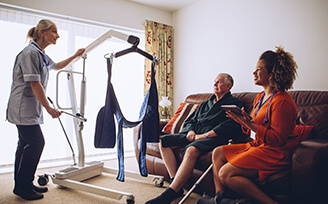How Much Does Home Care Cost?

At some point, most families will need to explore senior care services for a loved one. For many people, however, a private room in a nursing home can be prohibitively expensive. It can also feel isolating and disruptive to the routines their loved one has grown accustomed to. In-home care presents an attractive alternative.
According to the Genworth Cost of Care Survey, the costs of various forms of care, including in-home care, can vary significantly by location and type of service. The cost of home health is influenced by factors such as the level of care required by seniors, insurance coverage, and the difference between home health care and home care.
While in-home elder care can be a significant investment, there are several payment options and funding sources that can help ease the cost. At ComForCare, we can connect you with resources and programs which may help. Together we’ll create a plan of care and a number of hours that is not only affordable but ensures your loved one receives the best in-home care possible.
The personal care aides at ComForCare understand providing care for your elder family member can be challenging. There are many levels of care available, as well as benefits you may not be aware of.
Talk to us about home care solutions and learn more about the companion care services covered.
Home Care Is The Least Expensive Option

Home care is generally less expensive than other senior care options. When considering in home care cost, it's important to provide detailed financial aspects and comparisons. Nursing home costs may range from about $200 to $250 each day for a basic room and care, while home health aide services, which include assistance from certified home health aides, are generally more affordable, adding up to a national average of about $5,600 to $7,000 a month. Assisted living facilities may cost about $3,300 per month for a simple one-bedroom unit.
Home health aides are trained professionals who provide essential medical and personal care services, making in-home care a valuable option for many families. The final cost of in-home care will vary considerably depending on the intensity of the client’s unique needs and the state they live in, but it usually remains considerably lower than these options. For example, the national average home health care costs (8 hours per week) is $693, which is significantly lower than the costs of nursing homes and assisted living facilities.
Here are some potential sources for funding needed care:
- Public resources
- Long-term insurance
- Veterans benefits
- Workers’ compensation insurance
- Life insurance
- Reverse mortgage funding
- Private payments
- Family member payments
Insurance coverage, including Medicare, Medicaid, and private insurance, can also help offset the costs of home health care services if certain criteria are met.
When considering senior care options, it's important to compare in home care costs to other senior living options, such as assisted living and nursing homes. This comparison can help you understand the financial commitment and the value of preserving seniors' comfort and well-being.
Still need help covering the expense of senior care? For home care budgeting tips and guidance, reach out to us now.
ComForCare’s Flexible Home Health Aide Services

One of the main benefits of receiving home care from ComForCare is the ability to set up a care schedule based on your timing needs. Family members can pitch in to help with senior care needs, meal preparation, and supervision when it is most convenient, so work and other obligations are not ignored. ComForCare can help fill in the gaps, ensuring your loved one is always taken care of — and the cost does not put undue stress on the family. As a certified home health care provider, ComForCare offers a range of medical and personal care services tailored to meet the unique needs of each client.
As needs change over time, ComForCare will work with you and make changes to the schedule and routine. Our home health services are designed to adapt to changing needs, ensuring continuous and comprehensive care for your loved one.
Save on Expenses

Receiving home care aid can help seniors to avoid falls and condition complications, which can save hospital expenses and pain. Caregivers also help with various household chores and homemaker services, so seniors are less likely to strain themselves and require medical attention and treatment. In addition to personal care, our caregivers can provide essential medical services, helping to manage health conditions and prevent complications. Having a helping hand with chores may also help seniors avoid breaking dishes or other home products. While home care might seem to be an added expense at first, it may actually help to save on costs and problems in the long run.
We can help families navigate the process of funding home care services. There are several ways to plan and budget for home care.
Talk to us about your options.
Save Family Members’ Time

When unexpected events occur in seniors’ lives such as injuries and condition complications, family caregivers generally have to miss work to assist with transportation, wait at the hospital for diagnoses, and help with transitional or ongoing care.
Home care services and skilled nursing care from ComForCare can help family members avoid missing work by providing personal care assistance and preventing these types of unexpected occurrences. If accidents do happen, our caregivers can also provide transportation, support, and at-home medical care.
While family members typically want to be with a loved one after medical events occur, the pressure is alleviated, and the need to miss work is not as pressing. This may be viewed as a time and cost savings, as well as a benefit for your loved one.
Reach Out Now for More On Home Health Care Costs
Are you looking for an alternative to assisted living communities? Are you worried about in-home senior care costs? With over 200 locations nationwide, ComForCare connects you to the home health care services you need.
Our home health care aides provide around-the-clock care, including medical assistance, personal care services, support with daily living/household tasks and chores, and even specialized memory care programs for those with dementia and Alzheimer’s disease. We match each person with a caregiver who fits their personality, interests, values, and life experience in order to carry out a successful senior care plan, all in the comfort of their own home.
For more about the comparisons between in-home care services, assisted living costs, and residential care facilities, reach out to us now. We’re here to answer your questions 24/7!

